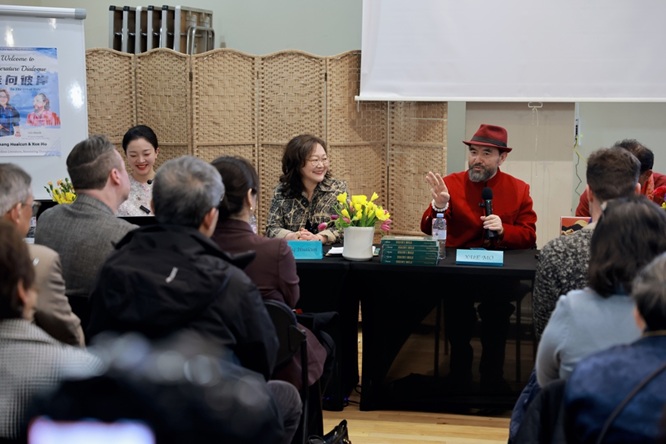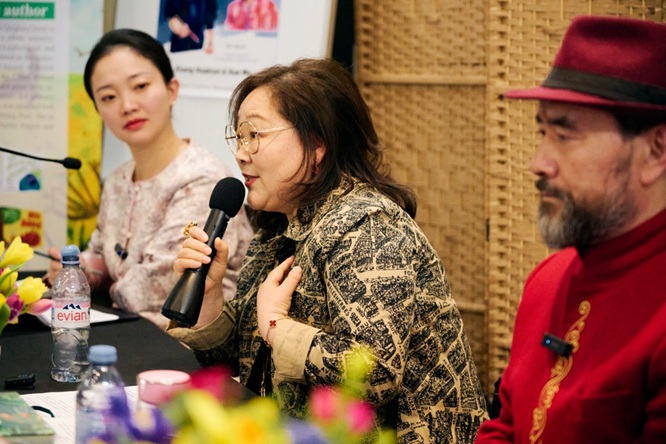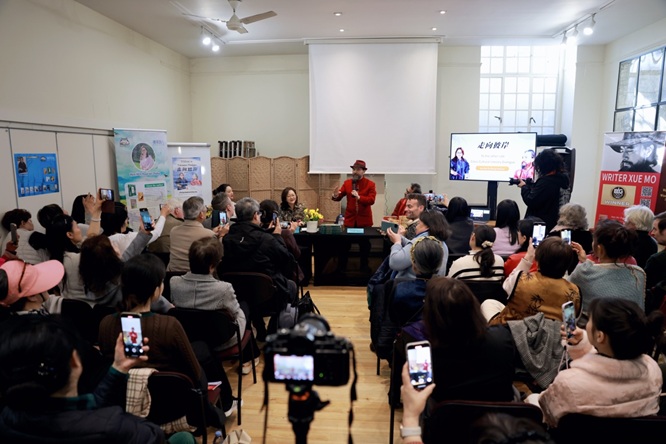
Xuemo
and Zhang Huaicun Discuss “Literature in the AI Era” in London
On
the afternoon of March 18, 2025, Chinese writer Xuemo and British-Chinese
children’s literature author Zhang Huaicun, a lifelong fellow of the Royal
Society of British Artists (RBA), engaged in a thought-provoking dialogue on
“The Role of Literature in the AI Era” at London’s Piccadilly. The event was
moderated by journalist Xu Liang, with Dr. Yukteshwar Kuma serving as the
translator. The discussion attracted nearly a hundred attendees, including Ms.
Wang Yun, Cultural Counselor of the Chinese Embassy in the UK, as well as Guy
Portelli, Vice President of the RBA and a renowned sculptor, along with several
British cultural celebrities.

As
generative AI tools increasingly impact the literary world, people have begun
to ask:
Is AI
really a threat to humanity? Will AI replace human writers?
Xuemo
was optimistic yet cautious, saying, “The real threat is not AI itself but the
tendency of the human heart. If driven by goodwill, AI can enrich the world; if
fueled by selfish desires, humanity will ruin itself. Technological advancement
must go hand in hand with spiritual growth, or humans will risk losing their
souls.” He was confident that while AI tools may excel in efficiency, they lack
human consciousness and the ability to experience life firsthand, which are central
to great literature.
Zhang
echoed this sentiment, emphasizing, “AI cannot replicate genuine emotions. In
other words, while machines can assemble words, they cannot breathe life into
them.” She believed that great literature stands out primarily due to emotional
resonance and spiritual guidance—something no algorithm, no matter how
advanced, can truly achieve.

During
the discussion, an audience member asked them about their sources of
inspiration. Xuemo responded with a vivid metaphor: “We must break free from
the confines of our little cup and merge with the vastness of the ocean-like
world; then the words will flow by themselves,” he said. Zhang Huaicun, on the
other hand, considered childhood curiosity and nature to be twin engines that
spark her “aha” moments. She shared a childhood memory of saving a bird and
explained how it shaped her storytelling.
Xuemo
was then invited to sing the classic piece “Yangguan Sandie,” which was adapted
from a Tang Dynasty poem. Xuemo’s performance vividly demonstrated how music,
literature, and authentic human emotions surpass AI’s capabilities in touching
the human soul.
Both
speakers agreed that literature must serve as a guiding compass and nourishment
for the soul in the age of AI. As technology continues to reshape industries,
humanity must return to its core values—truth, goodness, and beauty—which have
long been etched into the lullabies of human civilization: epics.
Notably,
Xuemo’s Suosalang is a masterpiece that embodies these eternal values,
encapsulating the primordial wisdom that humanity must seek and awaken in the
AI era.
It is
the best of times, and it is the worst of times. If literature can reclaim its
spiritual tradition and nourish the human soul, then everything will be just as
it should be.